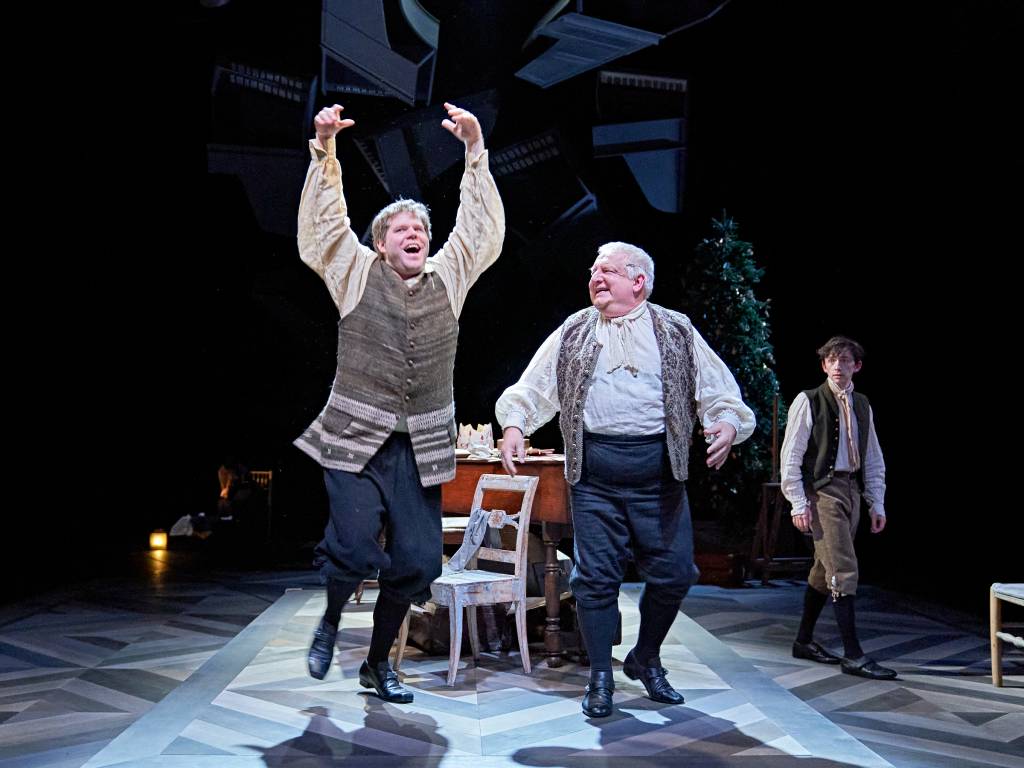Bach & Sons review, Bridge Theatre: Simon Russell Beale was born to play the great composer
Nina Raine’s new play, premiered in a production by Nicholas Hytner, is typically sly, in the know and phenomenally eloquent

In the heyday of the studio system, Hollywood knew no shame when it came to biopics about great composers. They sure knew what they wanted back then. Uplift, mostly, with a composer who conformed to a romantic ideal – pounding and riffling up and down the ivories with a strong suggestion that consumption might be in the offing. Or suicide.
Now imagine trying to pitch a biopic about Johann Sebastian Bach (d 1750). Though often considered the greatest composer of all time, he was a back-to-the-future boy with a missionary zest for musical counterpoint. He wrote for the glory of God not of himself. How unromantic.
Nina Raine’s new play Bach & Sons (premiered now in a production by Nicholas Hytner that moves with a terrific musicality) is typically sly, in the know and phenomenally eloquent. Counterpoint is the bringing together of two lines of music in a way that exemplifies how an honest life embraces more than one voice – playing off each other in contention or resolution. By shrewd design, Bach & Sons itself has at least two voices in contention – whether in resolution or continued argument.
Raine’s play has its cake and eats it. On the one hand, it’s a satire of sorts on the idea of pitching a Bach biopic. And on the other, it’s a learned demonstration of how such a thing might indeed be pitched, replete with loads of historical empathy.
The play could be subtitled “A Jobbing Genius and His Progeny”. With a sawn-off accent and a conductor’s weary savvy, Simon Russell Beale is first seen at the harpsichord keeping his family awake as he nags away a piece that won’t develop as he would like it to. With his background as a chorister at St Paul’s Cathedral, his exceptional talent as an amateur pianist, and his searching TV documentaries, has there ever been an actor better qualified to play this part?
Bach’s sons – Carl, the strict copyist for his father, and Wilhelm, whose wayward gift Bach is more intrigued by – ache for paternal approval. There are shades of James Dean and East of Eden, one of the other works explicitly referenced, as is the rift between the monarch and the truanting Hal in Henry IV Pt 2.
There are basically two attitudes about the reception of music. One is expressed by TS Eliot in Four Quartets, who writes of music heard so deeply “you are the music while the music lasts”. At the other end of the, erm, scale, there is the view that counterpoint can put one in touch with the music of the spheres.
Like all sublime performers, Simon Rusell Beale has become an anthology of his greatest roles. One of the things I love about his acting is the way he takes curtain calls. The ritual begins when he calls down the other actors in pairs to take their bows. And then there is the moment we have all been waiting for. He advances alone to centre stage. His arms are outstretched as if he would like to embrace the whole world. His eyes goggle with seditious mischief and with the sheer wonder of it all. How do you feel as an audience at such moments? From where I’m sitting, elevated.


Join our commenting forum
Join thought-provoking conversations, follow other Independent readers and see their replies
Comments